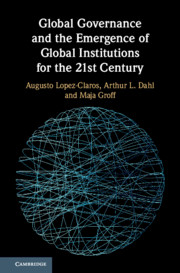Global Governance and the Emergence of Global Institutions for the 21st Century
Is there any hope for those who despair at the state of the world and the powerlessness of governments to find a way forward? Global Governance and the Emergence of Global Institutions for the 21st Century provides ambitious but reasonable proposals to give our globalized world the institutions of international governance necessary to address effectively the catastrophic risks facing humanity that are beyond national control. The solution, the authors suggest, is to extend to the international level the same principles of sensible governance that exist in well-governed national systems: rule of law, legislation in the common interest, an executive branch to implement such legislation, and courts to enforce it. The best protection is unified collective action, based on shared values and respect for diversity, applying widely accepted international principles to advance universal human prosperity and well-being.
This title is also available as Open Access on Cambridge Core.
Augusto Lopez-Claros is Executive Director of the Global Governance Forum. During 2017–19 he was Senior Fellow in the School of Foreign Service at Georgetown University. He is former Director of the Global Indicators Group at the World Bank and Chief Economist at the World Economic Forum. He is coauthor of Equality for Women = Prosperity for All (2018).
Arthur Lyon Dahl is President of the International Environment Forum and a retired senior official of UN Environment. He is the author of In Pursuit of Hope: A Guide for the Seeker (2019), The Eco Principle: Ecology and Economics in Symbiosis (1996) and Unless and Until: A Baha’i Focus on the Environment (1990).
Maja Groff is an international lawyer based in The Hague, working on multilateral treaties, at international criminal tribunals and teaching at the Hague Academy of International Law. A graduate of Harvard, Oxford and McGill Universities, she has drafted international legal policy documents and published on private and public international law, human rights and global governance.

